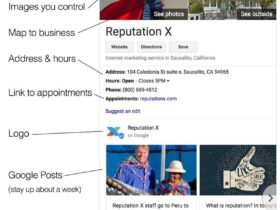There’s a reason some businesses don’t just attract clients—they keep them coming back again and again. It’s not luck, and it’s not just clever marketing. It’s authority.
When you grow real, recognizable authority online, authority that’s rooted in trust, consistency, and human connection, you move from chasing leads to becoming a magnet for them. Your presence builds belief. And when people believe in you, they become long-term advocates. They’ll spread the word, referring your work to friends and returning time and time again.
But here’s the catch: we’re in a trust recession. Buyers today are more cautious, more skeptical, and more selective than ever. With AI-generated content everywhere and faceless automation becoming the norm, people are doing their research, taking their time, and making decisions more slowly and carefully.
They’re no longer just asking, “Is this a good product?” They’re asking, “Do I trust this brand and the person behind it?” Consumers now prioritize brands that align with their personal values. That means your product, no matter how great, is no longer enough on its own.
People want to know the why behind your work. They want to feel a sense of connection, not just to what you do, but to who you are. They want a product created by someone who gets them, someone whose values reflect their own.
Being visible online is critical. You can’t build a brand if no one sees you. But visibility without credibility? That’s just noise. When your message lacks clarity, consistency, or authenticity, your online presence quickly loses its power. It’s not enough to be seen – you need to be believed. That’s what turns followers into buyers, and buyers into repeat customers.
That’s why how you show up matters. When you step out from behind the brand and share your voice, your values, and your story, you humanize your business. In a world that feels increasingly impersonal, that personal connection is necessary for building trust.
This Is Where Your Personal Brand Comes in
As a founder or CEO, your personal brand is more than just a professional label – it’s the foundation of your company’s authority. When you lead with realness, when you share your story and show your face, you transform your brand from a business into something people can relate to. You become the thread of trust your audience can hold on to.
And the data backs it up. According to recent studies, 70% of consumers feel more connected to a brand when its CEO is active on social media. Even more telling, 82% of people say they’re more likely to trust a company whose leadership has a strong, visible presence. In fact, people are more likely to purchase from a brand they perceive as human. In a world saturated with automation, showing up as you isn’t just a nice-to-have – it’s a serious competitive advantage.
And when that trust is built, everything changes. Your audience will share and invest in your work. They’ll continue to return for more. Visibility gets you in the room, but trust is what keeps you there.
Showing up online as your authentic self, consistently and with intention, doesn’t just make you relatable – it makes you profitable.
The Cost of the Trust Recession
Ever tried a new health supplement or beauty product, only to be totally let down when it didn’t work as promised? You’re definitely not alone. So many people are tired of feeling duped by companies that claim their products will change their lives, but fall short. The truth is, people are getting fed up with the constant stream of “perfect” promises that never quite deliver.
According to Edelman’s 2023 Trust Barometer, there’s a huge gap between what businesses think and what consumers feel. 84% of executives believe their customers trust them, but only 23% of customers agree.
This growing gap is what we’re calling the “trust recession.” As buyers become more savvy and skeptical of traditional marketing, this disconnect is only getting worse. People are starting to question the whole “buy more, be happier” mindset that corporate America has pushed for so long. They want their money to go towards real solutions – not just more stuff that doesn’t actually improve their lives.
So what does that mean for your business? It means your organic, high-quality, beautifully branded offer isn’t enough on its own. And even the best marketing won’t save you if people can’t connect with the person behind it. Today, trust is the real currency, and customers don’t just want to believe in your offer. They want to believe in you.
How to Build Trust
In a world where trust is at a premium, how do you build that trust and turn skepticism into belief? How do you show up and reclaim your authority online?
1. Lead with Purpose and Authenticity
Building authority starts with being authentic and transparent. As a CEO or founder, your personal brand is a direct reflection of your company’s core values. Share your “why” – why you started your company, what drives you, and the challenges you’ve overcome. This level of vulnerability humanizes your business and helps your audience feel more connected to you. You create opportunities for deeper emotional connections with your audience, which are critical for building trust and long-term loyalty.
2. Be Consistent and Visible
Consistency is key to building lasting authority. Your audience needs to know they can rely on you for regular insights and updates. Whether it’s weekly blog posts, social media interactions, or bi-weekly newsletters, staying top-of-mind through consistent engagement helps reinforce your credibility.
Being visible allows your audience to see you as a real person and not just a faceless brand. This visibility is what transforms a follower into a customer, and a customer into a loyal advocate.
3. Share Your Expertise and Insights
Position yourself as a thought leader by sharing your knowledge through blogs, podcasts, videos, or public speaking engagements. This provides value to your audience and establishes you as an expert in your field.
Thought leadership content is not only useful but trusted – nearly three out of four buyers consider it more reliable than traditional marketing materials. When you provide value consistently, your authority grows, and your audience begins to see you as a credible source of information they can trust.
4. Engage in Meaningful Conversations
Building online authority isn’t just about broadcasting your message –it’s about engaging with your audience. Responding to comments, participating in discussions, and showing appreciation for feedback fosters a sense of community. Engagement helps build strong, lasting relationships and shows your audience that you care about their opinions.
5. Showcase Your Team and Company Culture
Sharing stories about your team, celebrating company milestones, and showcasing your workplace culture reinforces the human side of your business, making it more relatable and trustworthy.
Building online authority as a CEO or founder requires time, consistency, and a genuine connection with your audience. By being visible, authentic, and actively engaging, you don’t just attract customers – you foster long-term loyalty and trust. These efforts compound over time, leading to a stronger, more influential personal brand that propels your business forward. Remember, trust is the new currency in today’s digital world, and when your audience believes in you, everything changes.
Ready to Build Your Online Authority?
If you’re serious about growing your personal brand and building real trust online, start with one of the platforms where authority matters most—LinkedIn.
Check out our podcast episode, How to Build Your Authority on LinkedIn. In this conversation, we break down the exact steps you can take to show up more authentically, create meaningful connections, and turn visibility into influence.
Want support putting these strategies into action? Head to thebrandiD.com to learn how we help founders, CEOs, and thought leaders like you build powerful personal brands that fuel long-term business growth.
About The Author
Rachel Gogos is a multi-passionate entrepreneur with a strong desire to help people by creating strong personal brands and businesses. She’s personally launched dozens of books, e-products, and services; and hundreds of products and services with her clients. She started her career at the United Nations headquarters in New York City, where she helped create the look and feel for the organization’s first website.
Today, in her current role running brandiD, Rachel channels over 15 years of marketing and communications experience into each and every website for brandiD’s clients.
And check out her book, Build Your Brand: The Distinctive Guide to Soul-Based Marketing. It will help you uncover your personal brand.
















